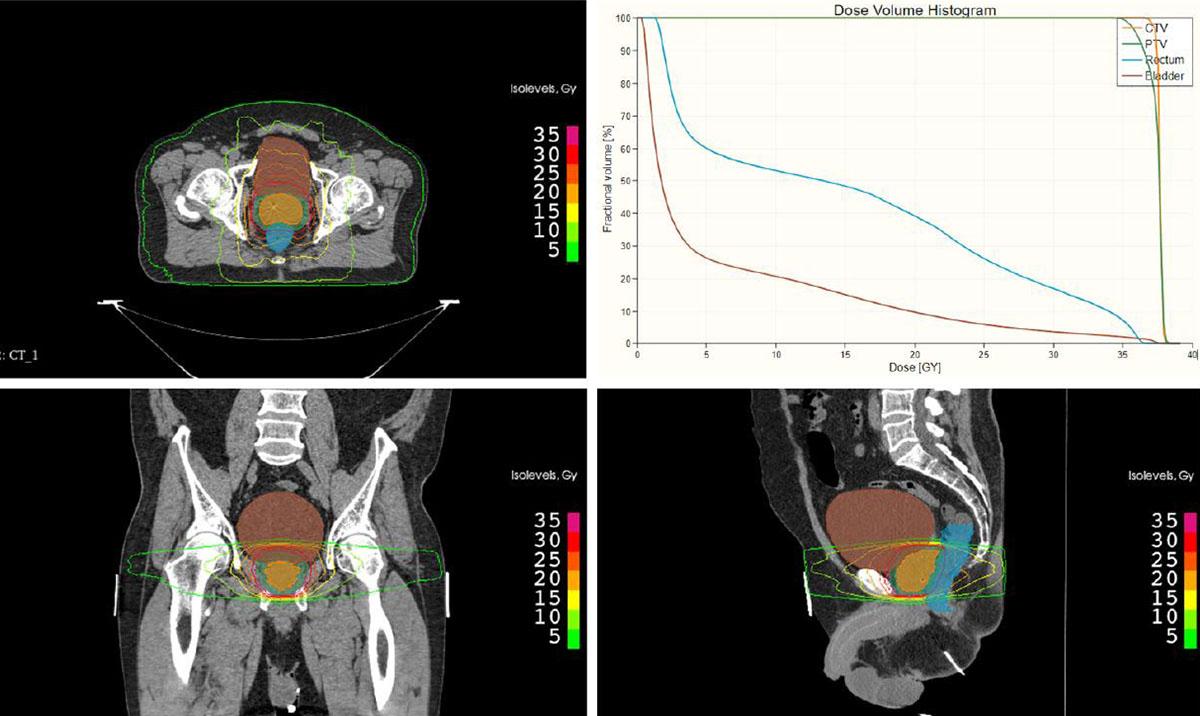Building a platform for prostate cancer research
26 November 2024
PROSECCA (Improving radiotherapy in PROState cancer using EleCtronic population-based healthCAre data) is advancing the state of the art in radiotherapy treatment for prostate cancer.

Above: A radiotherapy plan for a patient with prostate cancer showing the clinical target volume, which includes the prostate (orange), bladder (brown), rectum (blue) on the axial (top left), coronal (bottom left), and sagittal (bottom right) plane with isodose levels as well as the corresponding dose volume histogram (DVH) (top right).
With £1.2m from Prostate Cancer UK and the Movember Foundation, the PROSECCA project brings together researchers from all five Scottish Cancer Centres to create a research platform with clinical data from radiotherapy treatments Scotland-wide; including digital imaging, treatment plans and outcomes.
The PROSECCA team are linking this data with information from patient healthcare records to create a unique resource, providing long-term information on a patient’s journey and outcomes and making it possible to find population-based predictive biomarkers of treatment response. This will pave the way to radiotherapy treatments that are tailored to individual patient needs and ultimately improved outcomes and reduced side effects.
In PROSECCA, AI methods are applied to build these predictive models. For example, quantifying the long-term risk of serious adverse effects for a patient after prostate radiotherapy, informed by outcomes from previous patients for up to 12 years after treatment. Long-term effects include incontinence, urinary tract problems, and gastrointestinal symptoms, which can be very debilitating for a patient after treatment. Reducing or eliminating these effects will have a significant impact on a cancer survivor’s quality of life.
PROSECCA will provide vital information to help personalise, or adapt, a patient’s course of radiotherapy by suggesting:
• The best form of therapy
• The most appropriate dose and delivery schedule
• The optimal timing
• The best mechanism for assessing any proposed personalised treatment.
It will provide a tool with which a patient can make informed choices based on what matters to them.
PROSECCA is only possible because of the national scale of radiotherapy and patient records being collated and studied.
Data resource
Establishing the data resource for the PROSECCA project is being addressed in two parts. The first has been to obtain approvals through local health boards for access to radiotherapy data. The second has been to obtain approvals from the Health & Social Care - Public Benefit & Privacy Panel for access to digitalised health informatics data held by NHS Scotland. The combined data resources, with all patient records pseudo-anonymised, are ingested into a secure platform specially designed and built for the PROSECCA project by EPCC.
Realising the objectives of PROSECCA requires powerful computing resources such as those managed by EPCC. This includes the Tier-2 Cirrus HPC system and the Edinburgh International Data Facility. What makes the PROSECCA environment different is that researchers not only have access to a unique radiotherapy dataset but also the computing power to properly study it.
At the time of writing, the PROSECCA dataset has records from more than 7,000 patients and is growing all the time. The EPCC team has recently built a prototype virtual environment hosted in Edinburgh, which is being evaluated by researchers in Edinburgh and Glasgow.
Future developments
Looking to the future, the team is pursuing further funding to integrate a treatment-planning system into the PROSECCA platform. This will enable researchers to much more easily and rapidly interpret key information in the radiotherapy records, relating to radiation doses received by surrounding tissues and the precise organ locations on a day-by-day basis during treatment.
The work of the PROSECCA team has received significant attention from peer projects and related studies both within the UK and internationally. This approach to creating a whole-of-Scotland data resource is a valuable blueprint for others, and there is significant potential benefit to linking PROSECCA into other studies and healthcare data resources in the future.
Acknowledgements
The PROSECCA project is led by Professors Bill Nailon and Duncan McLaren (School of Engineering/Edinburgh Cancer Research Centre/Institute of Genetics & Cancer) and features a multidisciplinary team that includes University investigators and staff from EPCC, the School of Engineering (Oncology Physics and the Institute for Digital Communications), and the Usher Institute, as well as collaborators from NHS Lothian, NHS Grampian, NHS Greater Glasgow and Clyde, NHS Highland, and the University of Glasgow.
The PROSECCA team is very grateful to Prostate Cancer UK and the Movember Foundation for generously supporting this project (MA-CT20-010). The team is also very grateful to the Scottish NHS Cancer Centres for support and providing data. Finally, a special thanks must go to the very active former patients and members of the public who help continue to help shape all aspects of the project.

